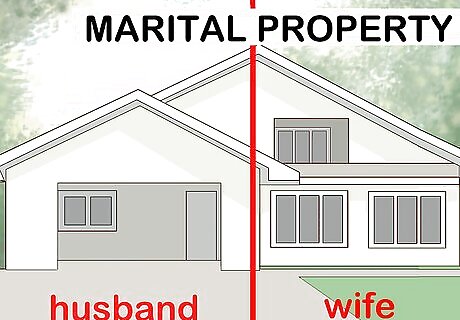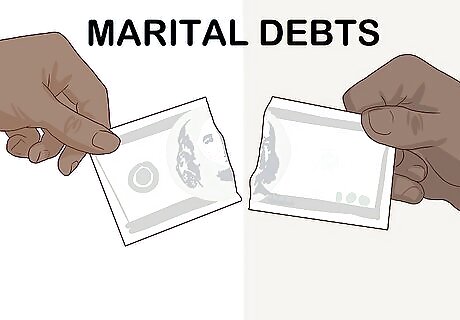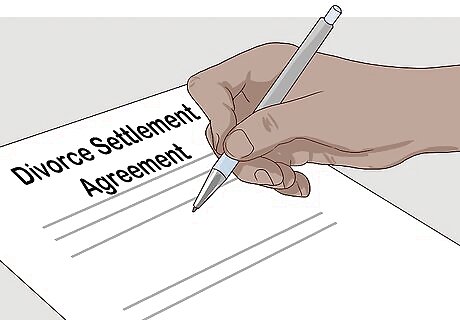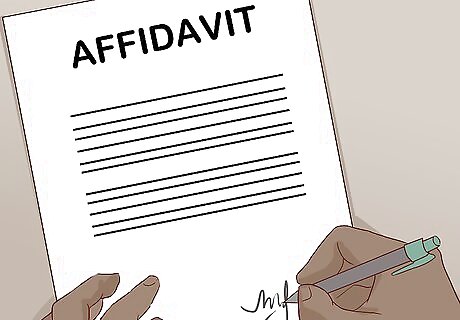
views
X
Research source
If you disagree about any of these issues, your divorce is not uncontested.
Reaching Agreement on Key Issues

Agree on alimony. Alimony is money one spouse pays to the other, either for a limited amount of time or indefinitely. In some states, alimony is called spousal maintenance. Generally, judges award alimony to prevent any unfair reduction in living standards caused by divorce. For example, one spouse might have forgone a career to support the other spouse as they earned degrees and started a business. The spouse who made these sacrifices is usually compensated. Discuss with your spouse whether either of you want alimony and for how long. For example, you might agree to pay alimony until your spouse finishes a college degree.

Create a parenting plan. If you have children, you need to decide who they will live with and how much time they will spend with each parent. States strongly encourage both parents to stay involved in their children’s lives. Read your jurisdiction’s laws regarding custody and visitation, which you can find online. Most couples divide custody, even if the children don’t spend an equal amount of time with each. For example, the children might live during the week with one parent and have visitation with the other every other weekend. A parenting plan involves much more than visitation. You also need to explain how you will transport your children, when each parent can call the child, and how you will resolve disputes. Draft your parenting plan and have both parents sign it. Check with your court, which might have templates you can use.

Agree on child support payments. The judge will decide how much child support the non-custodial parent has to pay the other parent. Each jurisdiction has a formula the court uses to calculate child support, and you can expect the judge to follow it. You shouldn’t agree to a child support payment that is lower than the amount set by the formula, otherwise the judge might not approve your plan. There are child support calculators online you can use to find out how much the non-custodial parent should pay. Also account for unusual circumstances. For example, if your child is disabled, then the non-custodial parent might need to pay more in child support.

Divide marital property. Marital property is whatever you obtained as a couple while married. If you inherited something while married, or owned it before marriage, then it isn’t marital property. A judge will need to divide it before granting a divorce, so you should decide how to divide it yourselves. Try to divide it fairly. Generally, marital property is any property bought during the marriage, regardless of whose name appears on the title or deed. If there are community property laws in your area, this property will be split in half. If there are no community property laws in your area, a judge will decide what the fair division is. Most judges will split it 50/50. Exceptions to marital property may include gifts, inheritance, and 401K accounts.

Allocate marital debts. You also need to divide your marital debts, just as you did your marital assets. Sit down and draw up a list of all marital debts. Decide who will pay what. Like marital property, marital debts are also defined differently in community property jurisdictions versus common law ones. In most U.S. states, a debt belongs to the spouse who incurred it, unless the debt was used for a family necessity. In community property states, a debt generally belongs to both spouses if it was incurred during the marriage—even if only one spouse signed the paperwork.

Draft a divorce settlement agreement. Take all of your agreements and incorporate them into a divorce settlement agreement. Both spouses should sign it and keep a copy. You’ll submit it to the court for the judge’s approval. Some courts have templates or forms you can use, which makes typing it up very easy. Otherwise, find samples online so you understand what a divorce settlement agreement should look like. Your parenting plan is part of the settlement agreement. You can also submit it separately.
Finding Help

Attend mediation if you can't agree. You might disagree on one or more issues. Try to work through any disagreements, and meet with a mediator if necessary. A mediator is a third-party neutral who is skilled at getting couples to talk with each other. Mediation is voluntary, but many couples find it helpful. Find a mediator by contacting your courthouse, which might have a mediation program. You can also find mediators in your phone book or by contacting your community center. Mediators typically charge a few hundred dollars an hour. However, mediation is almost always cheaper and faster than having a contested divorce.

Consult with a lawyer, if necessary. A divorce lawyer can be very helpful if you have questions or if you need help completing paperwork. Contact your nearest bar association and ask for a referral. You should probably also consult with a lawyer if any of the following situations apply: One spouse is much more educated or wealthier than the other. A judge wants to divide marital property fairly, and a 50/50 split of property might not cut it, depending on where you live. You have a disabled child, or one spouse is disabled. You live in a community property state and it’s unclear who owns certain property or who is responsible for a debt. In the U.S., community property states are Arizona, California, Idaho, Louisiana, Nevada, New Mexico, Texas, Washington, and Wisconsin. You’ve recently moved to a new state. You’ll need to figure out where to get divorced or if you need to wait.

Meet with a family law facilitator. If you can’t afford an attorney, your court might have a self-help center or a family law facilitator. Stop in and check if someone is available. They can review your paperwork and answer any questions you have.
Filing Your Paperwork

Find the right court. You’ll petition for divorce in the county where either you or your spouse lives. If you have children, file in the county where the children live. Every state also has residency requirements. You must have lived in the state for a certain amount of time before a court will agree to divorce you. Check your state’s residency requirements online.

Fill out your forms. Stop into the courthouse and ask for divorce forms. Typically, you’ll need to complete a petition or complaint, as well as a couple other forms. These forms may also be online. Tell the clerk you are having an uncontested divorce. On the off chance the court doesn’t have forms, you can try to find sample divorce petitions online or consult with a lawyer.

Submit your paperwork. Make several copies of all completed forms. You should submit your divorce settlement agreement along with your paperwork. You will also need to pay a filing fee. If you can’t afford the fee, ask the court for a fee waiver.

Ask your spouse to agree to service. Whoever files must give the other spouse notice that they filed for divorce. In many courts, your spouse can sign an affidavit or other form agreeing to waive the service requirement. File this form with the court.

Schedule a court hearing. In some states, you’ll need to go before the judge, even if your divorce is uncontested. If so, you should schedule a court hearing when you file your paperwork. In other places, you won’t need to go to court for an uncontested divorce. Check with the court clerk.

Attend a court hearing. Arrive early and have a seat in the courtroom. Typically, the judge will ask you questions to find out if you are eligible for divorce. You may also need to answer some basic questions about when you married and when you separated. In some courts, you can also change your name at the same time. Once the judge grants the divorce, they will sign the divorce decree. You might get a copy before you leave, or it might be mailed to you.




















Comments
0 comment